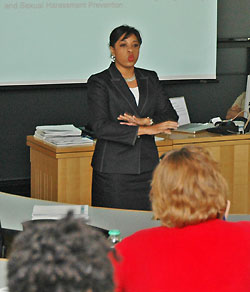For more archives, go to the Advance Archive/Search Page.
Expectations, Responsibilities, Fair Practices
To Be Covered At Diversity Workshops
Diversity training workshops for all UConn employees that will begin in late October will be unlike anything faculty and staff have seen in the past.
 |
Dana McGee, director of the Office of Diversity and Equity, addresses volunteers
during a diversity training session at the School of Business.
|
"These are not your father's - or mother's - diversity workshops," says Dana McGee, director of the Office of Diversity and Equity. "The workshops are designed to be relevant to our academic environment and to provide actual tools and standards of behavior, rather than focusing on feelings and attitudes."
Diversity training is mandatory for all state employees. The workshops will include helping participants recognize discriminatory behavior and what constitutes a bona fide complaint.
McGee says her office handles complaints regarding discrimination, harassment, flawed employment decisions, and civil rights violations, including complaints filed with McGee's office, as well as those filed with an external agency, including the Commission on Human Rights and Opportunities, the Equal Employment Opportunities Commission, and the Department of Higher Education.
"The University's responsibilities are as basic as they are compelling," says University President Philip E. Austin. "First, and above all, we are fully committed to the concepts of diversity and fairness that lie at the core of any great academic institution. Second, we need to assure that members of the University community understand the importance of that commitment. And third, we have to guarantee that every individual on all of our campuses knows not just what the law requires, but what the University expects, and how best to achieve it."
The workshops were developed by McGee with the help of a consultant, Katrina Wade Golden.
McGee's goal is for UConn's 3,500 faculty and staff to know the standards to which the University and the federal courts hold them, and for the University community to become more hospitable for its increasingly diverse population.
"The objective of this educational effort is to make certain faculty and staff understand their obligations and the penalties for violating the pertinent rules and laws. Ultimately, I want these workshops to be proactive by improving the climate at the University and the performance of our personnel, which in turn will result in fewer compaints," she says.
McGee recognizes, however, that in the short term, the workshops may bring more work to her office.
A component of the training informs faculty and staff - particularly those with a supervisory role - how they are required to respond, and what steps they must follow, when an employee expresses to them a concern that another employee may be harassing them.
"When an employee reports a potential problem, that conversation must be reported to my office immediately, if for no other reason than to have it on paper that a complaint has been made. Even if the employee never follows up on the complaint, at least there is a record of it," McGee says.
Also, she says, it is vital that all complaints are taken seriously and are processed consistently and properly.
"If it is a discrimination or harassment complaint, it must be forwarded directly to my office," McGee says. "It is not appropriate for managers and supervisors to try to resolve these problems without the involvement of our office."
The workshops will be made as convenient as possible for participants, McGee says, with sessions offered at a variety of times to accommodate the schedules of faculty and staff. Workshops will be offered at all campuses, including the regional campuses and the schools of law and social work. The Health Center will deliver its own workshops.
Last month, McGee and Wade Goldman began "training the trainers." Two groups - one comprised of faculty, the other of staff - spent two days learning the nuts and bolts of federal and state laws, and UConn policies and regulations, regarding discrimination, harassment, fair hiring practices, other constitutional protections, various facts and figures, and tips on how to keep an audience engaged. The volunteers were recommended for the task by deans, directors, union leaders, and colleagues. Most have delivered presentations before, although not about compliance with respect to harassment and discrimination.
The volunteers also have been asked to recruit other potential trainers. McGee says she would like to have at least 25 to 30 faculty and the same number of staff join the effort. She says each trainer will lead four sessions, and serve as a support person for another trainer in four other sessions. She doesn't want any of the trainers making solo presentations, because there could be a large volume of questions to which one person may not have all the answers. Two people also can better keep the group focused than one, she says.
Each class will have no more than 25 participants.
The educational approach the workshops will take was clear during the talks by McGee and Wade Goldman at the "train the trainer" session. The two said that UConn takes complaints seriously, and wants faculty and staff to know that.
"It's important for you to push the issue, make it clear that we're really serious," Wade Goldman told a group of about 16 staff members attending the training.
"To the extent that we depend on public funds to operate the University, we must ensure that our work environment reflects a certain norm and that we comply with the legal and statutory requirements," McGee said. "If we are inviting the best students, faculty, and staff to join us, then it is imperative that our standards of behavior are consistent with our aspirations."

